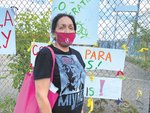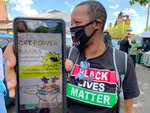













The city received 1,063 comments from individuals and organizations opposed to expanding the public works facility into the Roof Depot site at Hiawatha and 24th, and only two in favor of it.
Instead, the majority of people voiced support for the East Phillip indoor urban farm project along the Midtown Greenway, which has been designed by community members and would incorporate indoor farming and aquaponics, solar energy, affordable housing, a market, a bicycle repair shop, and business start-ups.
These comments were submitted in March 2021 as part of a comment period on an environmental assessment worksheet (EAW) that the city completed.
Due to the “unprecedented amount of public comment,” Minneapolis City Council members delayed reviewing it to give staff time to review and assess the information, according to Minneapolis Principal City Planner Hilary Dvorak.
East Phillips Neighborhood Initiative, Minnesota Center for Environmental Advocacy, Move Minnesota, Corcoran Neighborhood Organization, University of Minnesota Environmental and Energy Law Society, and Southside Green Zone Council all submitted comments against the city’s plan.
As part of the East Phillips Neighborhood Initiative comment, professor and scientist Dr. Gregory Pratt pointed out that the city’s EAW didn’t address the impact to adjacent homes of the use and storage of hazardous materials and generation of hazardous wastes; the potential cumulative effects of the two neighboring industrial facilities, Bituminous Roadways and Smith Foundry; emissions from diesel vehicles and small, mobile asphalt heaters.
Dr. Ted Schettler stated that any MPCA permits required for the proposed project will trigger the need for a Cumulative Effects and Environment Justice evaluation prior to applying for any necessary MPCA Permits considering the history of contamination on and around the site due to the former CMC Heartland arsenic factory there.
Environmental racism
The East Phillips neighborhood is a historically polluted neighborhood made up of predominantly low income, people of color, and the historic contamination from past and current industry in the area have exposed BIPOC residents to contamination in soils and air, pointed out the Minnesota Center for Environmental Advocacy (MCEA).
The MCEA stated that the proposed project forces residents of East Phillips to tolerate more polluting industrial facilities. It indicates that the city has an opportunity to convey to its residents that it is committed to addressing the issues of environmental justice within Minneapolis, in particular East Phillips.
According to the University of Minnesota Environmental and Energy Law Society, the EAW failed to acknowledge that East Phillips is consistently ranked as having some of the worst air quality in Minnesota, in addition to the high levels of toxicity in the soil from arsenic, antimony, and other chemicals.
Many of the public comments also pointed out the city’s project conflicts with the city’s own Green Zone Initiatives. Plus it contradicts Hennepin County’s Environmental Justice promises and is contrary to the state’s goals to address environmental impact disparities.
City suspends project for now
On April 30, the city council voted 12-1 in favor of a staff direction to suspend the city’s expansion of the Hiawatha facility in East Phillips. This staff directive was written by city council members Alondra Cano (Ward 9), Cam Gordon (Ward 2), Andrew Johnson (Ward 11) and Andrea Jenkins (Ward 8).
Staff were directed to return in August with a report on the financial and operational implications of terminating the city’s interest in this parcel and identifying another site for a facility, including but not limited to a process, a timeline, and budgetary needs. They were also asked to recommend a process for how to sell all or a portion of the Roof Depot site.
In addition, at the Business, Housing, Inspections, and Zoning Committee (BHIZ) on May 4, the associated Environmental Assessment Worksheet (EAW) was postponed until Aug. 5 at Committee of the Whole (COW).
“I’ll continue to stand with the community and continue to work hard in helping realize their vision,” stated Johnson.
Citing the ongoing lawsuit filed by community members in response to the city’s public works facility, Ward 12 Council Member Jeremy Schroeder declined to make a statement on the urban farm, but pointed out he did vote with the majority of city council members to suspend the city’s project through August. Mayor Jacob Frey did not respond to the Messenger’s request for comment.
‘It’s a health hazard’
Despite the uncertainty of the next step, urban farm supporters gathered at the Roof Depot site on Saturday, May 15 to celebrate how many came together to make their voices heard. They enjoyed food from the Indigenous Food Lab and decorated new signs for the fence around the building.
Corcoran resident Paula Holden said, “I’m here to support East Phillips Neighborhood Institute and the community here is really envisioning a positive project that will meet the community’s needs and to help stop the city from expanding this harmful truck maintenance yard that will add to the air and noise pollution in the area. The neighborhood folks can’t move but the city has other options where to put this facility. It’s an environmental racism issue.”
For Joe Vital, the city’s refusal to support the EPNI indoor urban farm at the Roof Depot site is an issue of environmental racism. “It’s absolutely frustrating,” he said.
A Powderhorn resident and Red Lake Band member, Vital formerly lived at Little Earth, and many family members are still there.
“I want to see the urban farm happen because every year at Little Earth we bury people,” stated Vital. “We had to bury six people this year because of complications from this zip code. We have the highest rate of asthma and lead poisoning in the city. East Phillips has been a toxic dumping ground for the city since the 1920s. One death should be enough to motivate anyone.”
He pointed out that the solar energy generated at the site and added to the city’s power grid (located just a few blocks away from the Roof Depot site) could make enough in a few years to pay for the cost of selling the site to EPNI.
Little Earth resident Marcella Ballinger is against the city’s project. “To me it’s a health hazard,” she said.
Lynnlake resident Tova Gorman stated, “It’s not like it will stop polluting at the neighborhood boundaries. It’s all related. I feel like the process of fighting gentrification is giving communities agency with what they want in their neighborhood.”
Get involved
View a pollution map and learn more about the indoor urban farm at http://www.eastphillipsneighborhoodinstitute.org/.
Comments
No comments on this item Please log in to comment by clicking here